Alumni Spotlights in Education
Alumni Reflections to Support Families During Online Learning
As families and children across the world continue to adapt to virtual classrooms, we wanted to connect with our extensive alumni network of professionals in education to share some of the lessons they have learned. We hope these reflections help support you, your children and their teachers as they continue their online classes and prepare for the summer.
We will continue to update this page with new responses. If you work in education and would like to contribute your thoughts, please send an email to Jacob Pelletier at jpelletier2@smcvt.edu.
Richard Long '77 - Westminster, VT
How did SMC help inspire you to become a teacher?
I was inspired in a great part to become a teacher because of the mentoring of two St. Michael’s
College professors, Dr. Norbert A. Kuntz and Dr. Edward Pfeifer. Both men inspired me to never
take for granted the opportunity I have as a teacher to help mold young minds. The liberal arts education at St. Michael’s helped me to value the self discipline necessary to see life from multiple angles. I believe this is fundamentally necessary to become a valued member of any
teaching community.What advice would you give to parents to help support their students
The advice I would give to parents to help support their students during this time of remote learning is to be there for them. They should help them structure their day at home as close to a time schedule as they have in their school. Do not omit time for phys ed, the arts, as well as their three r’s. Also education is a marathon, not a sprint. Model your actions at home so they see how self discipline works. Also reach out and ask for assistance from the teachers, they know your children as students better than anyone. We are all in this together.
What are some ways families can encourage learning throughout the summer?
The advice I give families throughout any Summer is to explore something they have an interest in. As a youth I found reading historical non-fiction an important learning tool. We visited historic sites like Fort Ticonderoga, Fort Independence, Fort #4 in Charlestown, NH, Concord and Lexington, Gettysburg, Calvin Coolidge’s home in Plymouth Notch, VT. Due to the pandemic we cannot get to many national or state parks today but for those fortunate enough to have internet access there are virtual tours that are available on the net. Whatever plan you implement for summer learning, make it fun.
Meghan Harrington '08 - Boston, MA
What is something you have learned since you first started teaching?
Humility and partnership! Kids keep it incredibly real- they’ll let you know when your hair looks weird, when you look tired, they’ll ask why you’re in a bad mood, and let you know when things are going well. Additionally, as a white woman teaching in a school with a population of Black and Brown children, it’s important to recognize that I am not a hero or a saint. I am not in the classroom to save children, I am in the classroom to help them discover their gifts and their magic that they have to offer the world. It is so humbling to engage in this work day after day, to give myself and my students the gift of a fresh start each and every moment of every day.
What advice would you give to parents to help support their students?
Use your kids interests and passions to help you! If they need to do a research project and they’re obsessed with Fortnite, let them look into coding or the history of video games. If they’re resistant readers, let them brainstorm a list of questions to which they want answers, and have their “reading minutes” be satiating their own curiosity. We often impose our idea of learning onto students, when kids of all ages are so innately curious. Let them ask questions and drive their own learning, not only will they learn but they will become more empowered, independent humans!
What are some ways families can encourage learning throughout the summer?
As much as you safely can, get out and about and explore. Again, I’m a firm believer in letting students strength and curiosity drive their learning. Let students ask questions, theorize answers, and read and research to learn. I’m always so tempted to just google the answer to those big, seemingly random questions kiddos often ask, but letting them wonder and theorize is so powerful. For reluctant readers, graphic novels are such an incredibly powerful tool and develop crucial skills such as making inferences, vocabulary acquisition, and for developing reading stamina.
Kristin McAndrew '06 - Denver, CO
How did SMC inspire you to become a teacher?
I was really fortunate to have amazing professors at St. Mikes. My absolute favorite professor was Dr. Valerie Bang-Jenson. She is a true example of an incredible educator and her love of pedagogy is contagious. She was there to support me when I got my first teaching job on a Friday in August 2006. I had 91 third grade students in my classroom that Monday and VBJ helped me go into that first year feeling confident. I was also inspired by my time abroad in Puebla, Mexico. This program allowed me many supports in real classroom contexts. I was placed in public and private school settings. This experience solidified my goals of working with children and utilizing my Spanish language skills, which I still do today!
What is something you have learned since you first started teaching?
I have learned that the power of a classroom community is boundless. I thought I understood the importance of this during my first few years. But now, I truly know that when a teacher creates a room full of acceptance and understanding, a classroom can be a magical place. When my students know we are a family, the academic and personal outcomes are amazing.
What are some ways families can encourage learning throughout the summer?
During the summer, and all the time really, I think at least one meal together a day is powerful. Talking, getting outside, reading and noticing your child’s interests are powerful and encouraging.
Lauren Boucher '86 - Marion, MA
How did SMC help inspire you to become a teacher?
When I was a student at SMC it wasn’t my plan to become an educator. Not that many years after I graduated, I changed course and began teaching middle school and then high school before becoming a college counselor. There’s no doubt that professors like George Dameron, Carey Kaplan, and Carl Zeno inspired me with their authentic teaching styles, their zest for their disciplines, and the way they connected with students. I can only hope that I have left a similar mark on the students I have taught, advised, and counseled. I love my work, and it all began at St. Mike’s.
What advice would you give to parents to help support their students?
Help your child understand the importance of being present. We cannot be at our absolute best every day, but getting out of bed, getting dressed, having something to eat, and being ready to contribute is critical. Role model this behavior. Be patient. Be positive. Be present.
What advice would you give to parents to help support their students’ teachers?
Let your children’s teachers know when they do something that inspires your child and helps him or her push through the tough days. My college counseling meetings with students are one-on-one, so I hear a lot. When a student shares that her Precalculus teacher makes her feel like she is actually sitting in his classroom (when she’s actually at her kitchen table) because of his consistency, routine, and good humor, I always make sure to let that teacher know that what he’s doing is working.
Stephanie Ludewig Hathaway '88 - Auburn, ME
What is something you have learned since you first started teaching?
As in any career, it is all about relationships! You can work hard and do a million things, but if you don’t have a relationship with your students, nothing else will matter.
What advice would you give to parents to help support their students?
3 things: 1) Establish a routine for consistency. Le your children know the expectations and then set a routine that will happen every day, and make sure to include lots of movement breaks. 2) Learning doesn’t have to look like a ‘traditional school setting.’ Games are the best way to practice and apply skills and concepts. Go for a walk and ‘notice and wonder’ about what you see and then research your wonders together. 3) Be patient with yourself. You are doing the best you can and any time you spend with your child will foster growth and learning
What advice would you give to parents to help support their students’ teachers?
Take time to respond to your child’s teacher when they reach out. If they are providing live online learning, make sure your child attends when possible. Most teachers teach because they love the interaction with children. Not seeing our students is the hardest thing and is what we miss most during this COVID-19 time.
David Hiltz '10 - Canton, MA
How did St. Mike’s help inspire you to become a teacher?
My education at Saint Mike’s inspired me to become a teacher because it taught me about human development and respect for the individual. Through my classroom experience, I was taught self reflection, empathy, and the impact our decisions have on others. The people, both friends, faculty, and staff at SMC, demonstrated the mission of the college everyday in their interactions with me.
What advice would you give to parents to help support their students?
Keep them on task! Change is hard for everyone, especially since everything has drastically changed in the past two and half months. I have found it is the human interaction, with help from Zoom or Google Hangouts or an email exchange with a student, that helps me stay motivated and gives me a sense of normalcy.
What advice would you give to parents to help support their students’ teachers?
Be patient and flexible. Just as students have experienced a huge change in routine, so have teachers! We all need to be mindful of that and be aware of the impact the changes can have on all of us.
Taylor Torres '14 - Austin, TX
How did SMC help inspire you to become a teacher?
I had known I wanted to be a teacher since I was young. Saint Michael’s places education students in a classroom very early on which only confirmed my vocation. After 5 month of teaching in a rural elementary school outside of Cusco, Peru, I knew I wanted to teach in a Spanish speaking community. When I discussed my teaching goals and aspirations with Aislinn Doyle in Career Services, she told me about a charter network called KIPP and helped me choose the right cities to apply to. Six years later, I am still working for KIPP in Austin, Texas.
What advice would you give to parents to help support their students?
It’s difficult to give general advice as each family’s structure and day to day schedule looks so different. However, I would try to value nature based learning as much as possible. While at Saint Mike’s, I completed a research paper on Nature-deficit disorder and the findings were alarming and very disheartening. So many children do not get adequate time exploring outside during their typical daily schedules. Use this flexible time to spend time getting in touch with nature! Conduct a science experiment by starting a small garden, hang a bird feeder and become bird watchers, get exercise together by hiking, biking or walking, journal and/or draw scenes you see outside…the list goes on. Follow your children’s interests!
What advice would you give to parents to help support their students’ teachers?
What brings me the most joy is when families text or email me pictures of my students doing everyday activities. One family sent a picture of my student snuggled up on the couch watching my recorded read aloud and it brought tears to my eyes! We miss our students so much.
Brian Shearer '18 - Baltimore, MD
How did St. Mike’s help inspire you to become a teacher?
Saint Mike’s offered numerous opportunities that ultimately guided me toward my profession. The liberal arts curriculum allowed me to take classes in various academic disciplines, expanding my interests and making me more appreciative of an education that develops the whole person. I settled on majoring in Political Science and Religious Studies because I passionately desired to learn more about various cultures and their many influences.
What is something you have learned since you first started teaching?
I think I speak for most teachers when I say that being an effective educator goes far beyond classroom instruction. I truly believe the profession is a vocation. I constantly assist students in service, attend retreats that seek to mutually edify one another, and spend hours simply listening to what my students have to say. It is vital that students feel their voice is heard.
What advice would you give to parents to help support their students’?
Students need some type of structure that includes more than just coursework. We witness many of our most active students also being our most productive. With school activities being put on hold, I think it is important to incorporate other opportunities at home or in the area to keep children and adolescents busy and active. Is there scheduled time for getting outside and being active? For learning a new hobby? For family bonding? Hopefully distance learning provides students some normalcy, but they need to engage other aspects of their lives as well.
Jacqueline Duane '09 - Salem, NH
What is something you have learned since you first started teaching?
Since I started teaching in 2009, I have taught 3 grade levels and at two different schools with different teams of teachers and administrators. No matter the school or grade level, forming strong relationships with my students, their families, and my colleagues at school has made all of the difference. Also, I have come to realize that regardless of experience in teaching, we all are still learning and can all learn from each other.
What advice would you give to parents to help support their students?
As a parent myself, I think it is important to remember that emotional needs are more important than academic ones at this time. Students are all in the same boat, and teachers are prepared to meet kids where they are and pick up the academic pieces when we can all return to school. It will be much harder to do that if kids are not in a good head space when we return. Don’t ignore all of the school work, but certainly do not let yourself or your child stress out too much. Also, please keep in touch with your child’s teacher; we are here to help even when we can’t physically be there.
What are some ways families can encourage learning throughout the summer?
I think that the best way to encourage learning over the summer would be of course to continue with having children read. Let them read what is interesting to them, or read books together as a family. Learning does not just come from books or learning apps though; summer is a great time to encourage outdoor play and exploration, especially if it means getting dirty! Learning also comes from helping with cooking and home projects, trying new hobbies and communicating with others.
Bridget Morse '09 - Lowell, MA
What advice would you give to parents to help support their students?
My advice for parents would be to take time for social emotional learning. This is a scary and confusing time for students. Take some time to talk about how they’re feeling, meditate, do some yoga, and maybe write a one-sentence a day journal to reflect on what their thoughts are about this time. Students can’t do their best learning unless their social emotional needs are met.
What advice would you give to parents to help support their students’ teachers?
Be understanding. We are learning how to teach remotely for the first time. Communicate with your student’s teacher. Let your student’s teacher know how your child is doing with learning activities.
What are some ways families can encourage learning throughout the summer?
This summer may look different for many families, but learning can still continue. Play card games with your student (like UNO) and add up the number cards that you have left at the end. Your student can take part in meaningful writing activities like writing a to-do list, letters to relatives, a movie review, or writing a shopping list. Encourage creativity. Give students recyclable materials and see what they can make. Model reading for your student. Take some time in the day where you and your student read at the same time.
Lea Stannard '14 - Middlebury, VT
What is something you have learned since you first started teaching?
I’ve learned an infinite amount about myself and the world around me since I began teaching. However, what stands out for me right now is that public schools are truly a microcosm of society and that’s what I love about my job. Each day presents a new challenge or revelation often reflected in a larger narrative I’m completely unaware of – pushing me to learn alongside my students about the complexity of their worlds. Through this, I have learned that teaching is often messy, but that’s what makes it so fun.
What advice would you give to parents to help support their students?
I would start by validating their stress because it is real and potent right now. I would tell them that the structure, stability and normalcy that we are trying to provide are all crucial strategies to help students process this change. However, any schoolwork that I assign will never be as important as my students’ mental health. At the end of the day, I’m not worried about them handing an assignment in on time, I’m worried about how they are doing. Also, I’m sure many parents would agree that screen time is out of control, educators talk about this regularly. Most of us would rather they take a walk, journal, read a book under the sunshine than be glued to their computer screens 12 hours a day – I would make space for this as much as possible.
What are some ways families can encourage learning throughout the summer?
Read all the books! I am a Social Studies teacher, so I focus a lot on written expression. The best writers are the students that invest in reading to expand their vocabulary. For rainy days, Ken Burns documentaries are also pretty great.
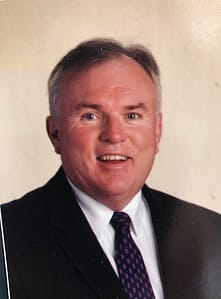
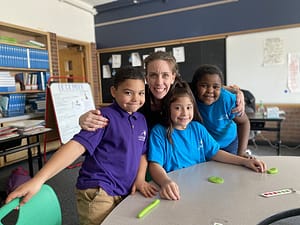 How did SMC inspire you to become a teacher?
How did SMC inspire you to become a teacher?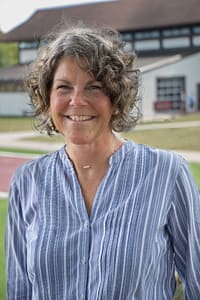 How did SMC help inspire you to become a teacher?
How did SMC help inspire you to become a teacher?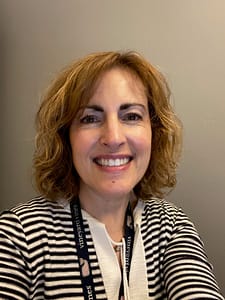 What is something you have learned since you first started teaching?
What is something you have learned since you first started teaching?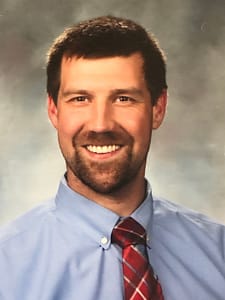 How did St. Mike’s help inspire you to become a teacher?
How did St. Mike’s help inspire you to become a teacher? How did SMC help inspire you to become a teacher?
How did SMC help inspire you to become a teacher? How did St. Mike’s help inspire you to become a teacher?
How did St. Mike’s help inspire you to become a teacher?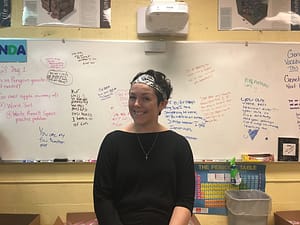
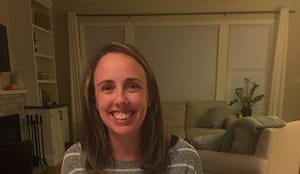 What advice would you give to parents to help support their students?
What advice would you give to parents to help support their students? What is something you have learned since you first started teaching?
What is something you have learned since you first started teaching?